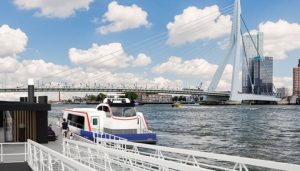
First composite vessel set to launch
First composite vessel set to launch
Damen is set to launch its first composite Water Bus as the prototype undergoes sea trials in the next few weeks. Customers benefit from reduced fuel consumption, less maintenance, no corrosion or fatigue problems, and at the same time, the Damen Water Bus is very robust. Besides safety and efficiency, the new Water Bus has also been designed to limit noise and vibrations, making it much more comfortable for passengers.
Marcel Elenbaas, Damen Design & Proposal Engineer – Fast Ferries, comments: “This is a prototype for the first of the new generation Damen Water Bus. We believe in this new composite vessel and the benefits it offers to clients. The Damen Water Bus is the best fit for highly congested urban areas, providing a simple and efficient way of making use of natural waterways, and consequently integrating into the public transport network. Hence the reason we took the decision to invest in developing this new series.”
The Damen Water Bus has a slender hull, less weight than a traditional aluminium vessel and low resistance, producing only a low wake and ensuring the vessel is fuel efficient. It can travel at up to 21 knots or 40 km per hour. The highly manoeuvrable vessel has a capacity up to 100 passengers

Another view from the first composite vessel
The vessel can easily be adapted to specific customer requirements, and the selected composites’ production process facilitates a swift delivery to clients. This next generation Water Bus is also very strong because it is built with high quality vacuum infusion technology, creating a ‘difficult to penetrate closed cell, epoxy sandwich structure’, he stresses.
Passenger comfort has also been given priority in the new design. The Damen Water Bus is equipped with two, forward facing, double-screw podded propulsion units, which reduce vibrations, besides offering low fuel consumption. Additionally, the exhaust of these units is under water, further reducing noise and vibrations. The vessel is also designed for easy and efficient boarding and passengers have panoramic views from the large windows on the sides and top deck.
Damen Shipyards Group has a long history of producing water taxis, water buses and ferries, mainly built from aluminium and steel, and intended for intensive public transport operations. Damen Shipyards is capable of offering the complete infrastructure system for water buses including jetties and bunkering stations, as well as training and services packages. This Water Bus is the first vessel for public transportation produced at Damen Shipyards Antalya, which specialises in composite professional workboat series suitable for heavy-duty operations. Typically up to 24 metres, these vessels include interceptors, patrol boats, pilot boats, crew suppliers and now water buses.
The first Damen Water Bus is expected to be in the Netherlands before the year-end and Damen has another Water Bus hull in stock ready for outfitting.
Damen Shipyards Group
Damen Shipyards Group operates 32 shipbuilding and repair yards, employing 9,000 people worldwide. Damen has delivered more than 6,000 vessels in more than 100 countries and delivers some 180 vessels annually to customers worldwide. Based on its unique, standardised ship-design concept Damen is able to guarantee consistent quality.
Damen’s focus on standardisation, modular construction and keeping vessels in stock leads to short delivery times, low ‘total cost of ownership’, high resale values and reliable performance. Furthermore, Damen vessels are based on thorough R&D and proven technology.
Damen offers a wide range of products, including tugs, workboats, naval and patrol vessels, high speed craft, cargo vessels, dredgers, vessels for the offshore industry, ferries, pontoons and superyachts.
For nearly all vessel types Damen offers a broad range of services, including maintenance, spare parts delivery, training and the transfer of (shipbuilding) know-how. Damen also offers a variety of marine components, such as nozzles, rudders, anchors, anchor chains and steel works.
In addition to ship design and shipbuilding, Damen Shiprepair & Conversion has a worldwide network of 16 repair and conversion yards with dry docks ranging up to 420 x 80 metres. Conversion projects range from adapting vessels to today’s requirements and regulations to the complete conversion of large offshore structures. DSC completes around 1,500 repair and maintenance jobs annually.





